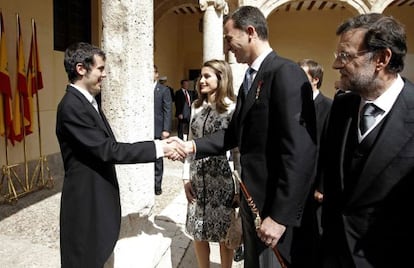An anti-ceremony for Cervantes- winning anti-poet Nicanor Parra
Nicanor Parra was awarded this year's Cervantes Prize in absentia on Monday His grandson was in Madrid to collect the award given the advanced age of the poet

You might well have called it an anti-ceremony for the creator of anti-poetry, Nicanor Parra.
Neither of the most important guests — the recipient or the prize-giver — were able to attend the gala to hand out this year’s Cervantes Prize, the most prestigious award in Spanish literature.
His advanced age meant the 97-year-old Chilean poet and mathematician sent his 19-year-old grandson, Cristóbal Ugarte, to Madrid in his place to accept the prize. Meanwhile, King Juan Carlos, still recovering from the hip injury he sustained during a controversial elephant-hunting trip to Botswana just over a week ago, was replaced by his son Prince Felipe at Monday’s ceremony at the University of Alcalá de Henares, just outside the capital.
“My grandfather has sent me to request a one-year extension for a moderately acceptable speech,” joked Ugarte.
“I have left him in Chile, surrounded by books, the majority of them editions of Don Quixote. He also had various encyclopedias open, with the most important pages marked by tea bags.”
Parra may have been thousands of kilometers away, but the typewriter on which he wrote many of his antipoems was present in Alcalá de Henares. Standing a few meters from it, Ugarte read out 10 of his grandfather’s creations, from ¿Esperaba este premio? (or, Did you expect this prize) to El hombre imaginario (or, The imaginary man) during the brief 40-minute ceremony — one of the shortest Cervantes galas in history.
In front of guests including the singer Patti Smith, Spanish Royal Academy director José Manuel Blecua, Cervantes Institute director Víctor García de la Concha and Minister of Culture, Sport and Education José Ignacio Wert, the prince paid tribute to Parra as a “twin of Cervantes.”
“We salute Nicanor Parra and all his alter egos: Mister Nobody, the imaginary man, the antihero, the individual,” said Wert, adding that Parra is “a poetic sniper who relativizes everything. He is not a wise man who overwhelms us with truths, but an everyday man who makes mistakes. Instead of an obscure language he speaks to us in words from daily life. Poetry, with Parra, comes from the street.”
Born in the town of San Fabián de Alico, in Chile’s Ñuble province in 1914, Parra is the oldest writer ever to receive the 125,000-euro award. The brother of the late folk singer Violeta Parra, he is the sole survivor of the group of great 20th-century Chilean poets that included Pablo Neruda, Gabriela Mistral, Vicente Huidobro and Gonzalo Rojas. Arguably still best known for his 1954 debut, Poemas y antipoemas, with which he began his output as a self-proclaimed “anti-poet,” he shuns traditional poetic techniques and styles, using a colloquial language in his work. “I look for poetry based on facts and not on combinations or literary figures,” he has said.
A mathematician and physicist, Parra also taught theoretical physics at the University of Chile in Santiago from 1952 until his retirement in 1991.
The Cervantes Prize was created in 1975 by the Ministry of Culture and has earned a reputation as the Nobel of Spanish literature. Previous winners include Jorge Luis Borges and Mario Vargas Llosa.
Tu suscripción se está usando en otro dispositivo
¿Quieres añadir otro usuario a tu suscripción?
Si continúas leyendo en este dispositivo, no se podrá leer en el otro.
FlechaTu suscripción se está usando en otro dispositivo y solo puedes acceder a EL PAÍS desde un dispositivo a la vez.
Si quieres compartir tu cuenta, cambia tu suscripción a la modalidad Premium, así podrás añadir otro usuario. Cada uno accederá con su propia cuenta de email, lo que os permitirá personalizar vuestra experiencia en EL PAÍS.
¿Tienes una suscripción de empresa? Accede aquí para contratar más cuentas.
En el caso de no saber quién está usando tu cuenta, te recomendamos cambiar tu contraseña aquí.
Si decides continuar compartiendo tu cuenta, este mensaje se mostrará en tu dispositivo y en el de la otra persona que está usando tu cuenta de forma indefinida, afectando a tu experiencia de lectura. Puedes consultar aquí los términos y condiciones de la suscripción digital.








































